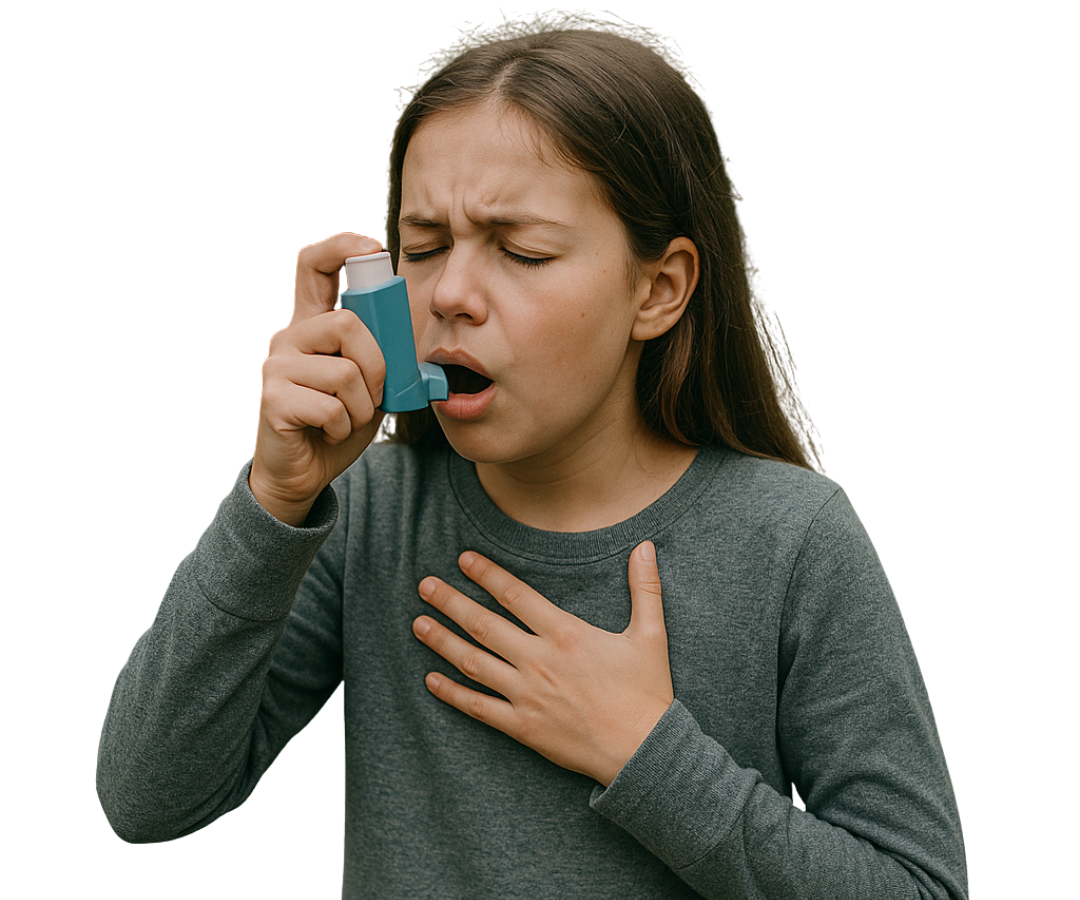Natural Relief from Asthma with Ayurveda
Take control of your asthma with trusted Ayurvedic care by Dr. Anu Jaiswal. With over 17+ years of experience, Dr. Anu offers personalized treatment plans that focus on lasting breathing comfort and overall well-being.

Types of Asthma
Pittaja Tamaka Shwasa (Pitta-type asthma)
- Dominated by the Pitta dosha.
- Symptoms include burning sensation in the chest, inflammation, yellowish sputum, and irritation in the respiratory tract.
- Attacks may worsen with heat, acidic foods, and infections.
- Patients may experience fever along with breathing difficulties.
Vataja Tamaka Shwasa (Vata-type asthma)
- Dominated by the Vata dosha.
- Symptoms include dry cough, wheezing, difficulty in breathing, dryness of throat, and chest pain.
- Attacks are often aggravated by cold weather, dryness, and stress.
- The sputum, if present, is scanty and thick.
Kaphaja Tamaka Shwasa (Kapha-type asthma)
- Dominated by the Kapha dosha.
- Characterized by heavy, productive cough with white, sticky mucus.
- Chest feels heavy and congested patients feel lethargic.
- Symptoms are aggravated by cold, damp, and oily foods.
Sannipataja Tamaka Shwasa
- Involves the combined imbalance of Vata, Pitta, and Kapha.
- Symptoms may be severe and mixed, including difficulty breathing, chest pain, excessive mucus, and inflammation.
- Requires more comprehensive treatment due to multiple doshas being involved.
Common Symptoms of Asthma

Wheezing or a whistling sound when breathing

Persistent coughing, especially at night or during exercise

Chest tightness or discomfort

Difficulty sleeping due to breathing problems

Shortness of breath or rapid breathing
Ayurvedic Specialist - Dr. Anu Jaiswal
With over 17+ years of experience, Dr. Anu is a pioneer in Techno-Ayurveda-blending ancient healing with modern science. She’s helped thousands of patients find relief from chronic pain when nothing else worked.
- ISO 9001:2015 Certified
- Noida’s #1 Techno Ayurveda Centre
- 10x Faster Healing with PEMF Technology
- Warm, patient-centred care in a serene environment

Management and Treatment of Asthma

Herbal Medicines
Ayurvedic herbs like Vasa, Tulsi, Licorice, Ginger, and Haritaki, with blends like Talisadi Churna, relieve bronchial congestion, reduce inflammation, and support respiratory health.

Dietary Modifications
Prefer warm, light, easy-to-digest foods; avoid cold, heavy, oily, and mucus-forming items like dairy, fried foods, and sweets. Include anti-inflammatory and digestion-boosting spices.

Lifestyle Changes
Managing respiratory health involves stress reduction through yoga, meditation, and Pranayama, avoiding cold, dust, smoke, allergens, and maintaining gentle, regular physical activity suited to one’s capacity.

Panchakarma Detoxification Therapies
Ayurvedic therapies like Vamana, Virechana, and Nasya help expel toxins, clear respiratory passages, and in some cases, Raktamokshana reduces inflammation for improved respiratory health.

Breathing Exercises (Pranayama)
Techniques such as Anulom Vilom, Bhastrika, and Nadi Shodhana improve lung capacity and oxygenation.

Routine Monitoring and Follow-up
Continuous assessment of symptoms and adjusting treatment according to dosha balance and patient response.
Still Unsure? Ask Yourself the Following Questions:
- Are you comfortable relying on inhalers without knowing if there’s a natural way to support your lungs?
- Have you tried treatments that only mask symptoms but don’t address what causes asthma?
- What would it mean to live a day without fear of sudden breathing trouble or attacks?
Success Stories
Frequently Asked Questions
Yes, Ayurvedic treatments use natural herbs and therapies focused on balancing your body without harmful side effects.
Ayurveda aims to reduce dependence on medications by improving your overall respiratory health, but any changes to medicine should be made under medical supervision.
Duration varies by individual condition, typically ranging from a few months to longer for chronic cases.
They are personalized and developed from time-tested Ayurvedic principles to support lung health and reduce symptoms.
- Yes, Dr. Anu offers safe and gentle treatment plans suitable for children as well.
